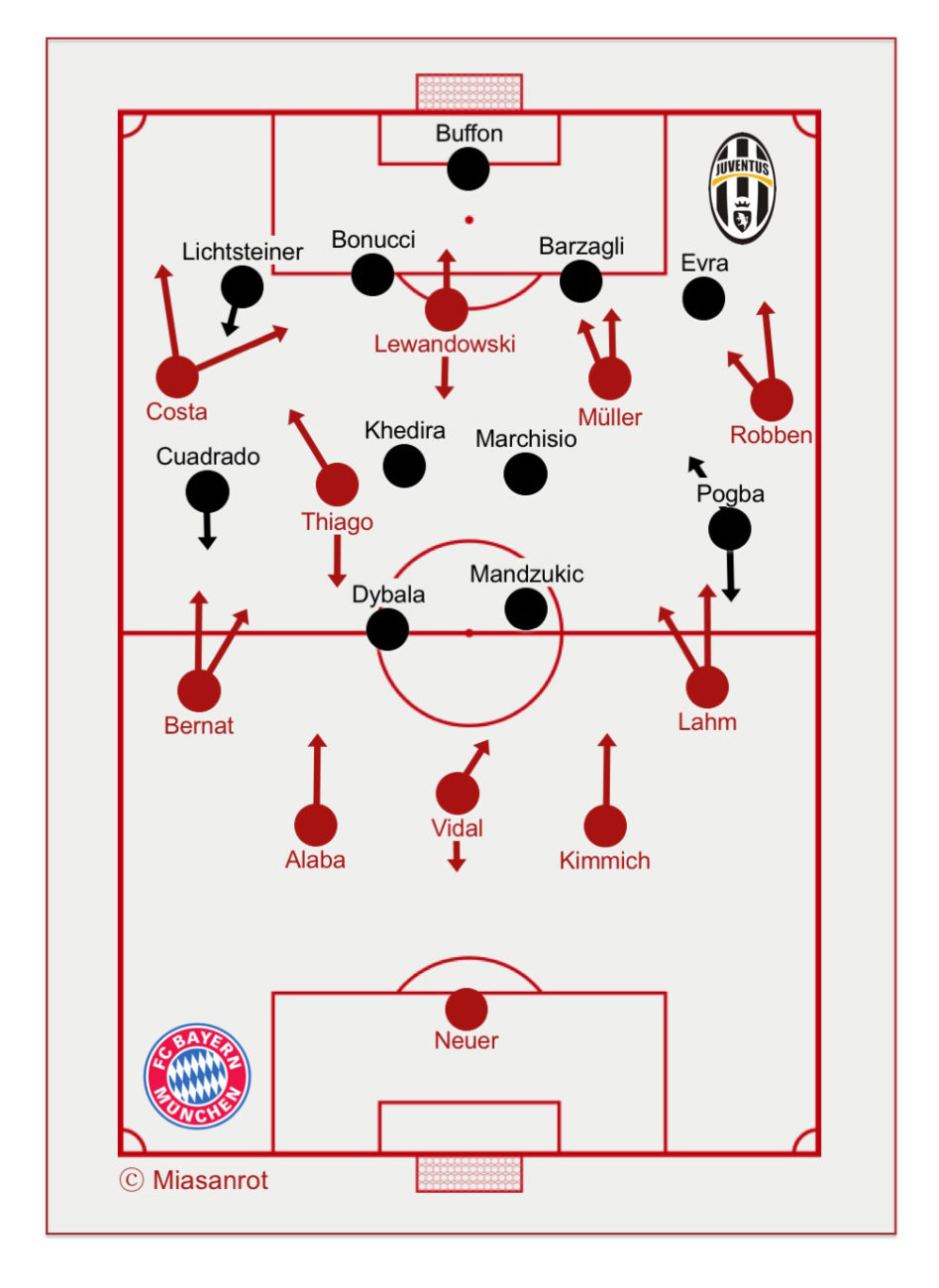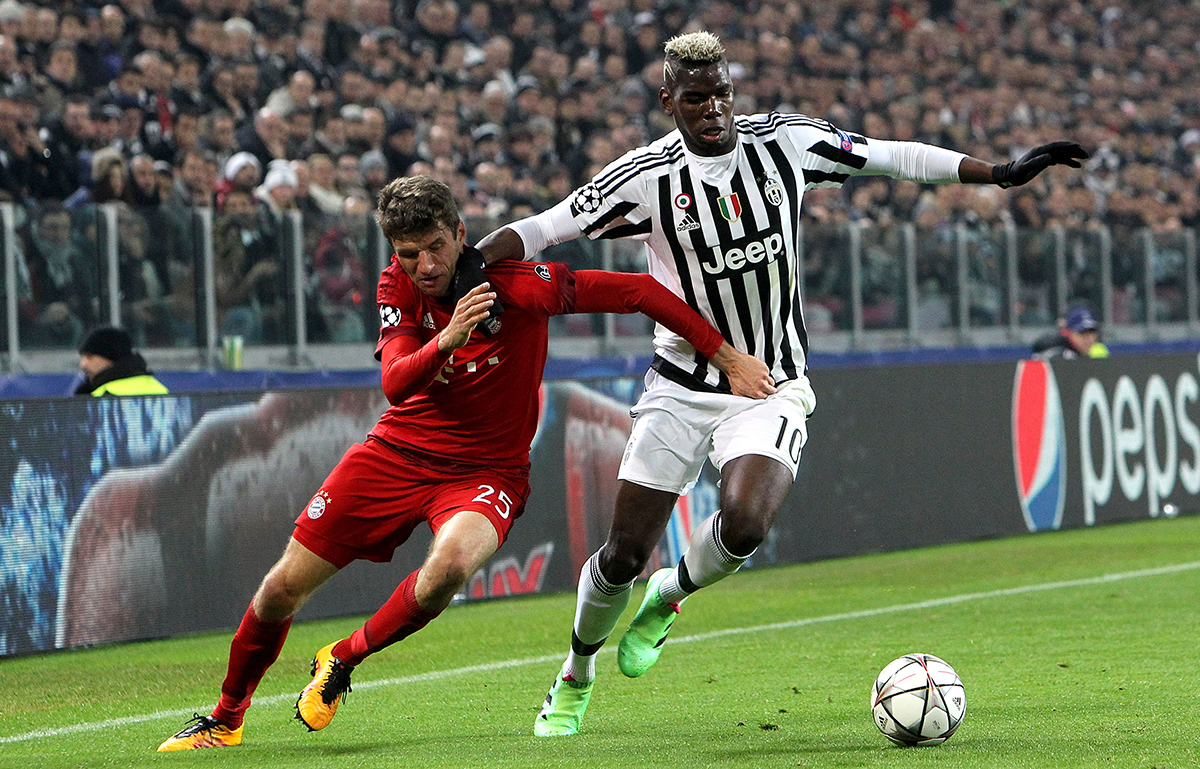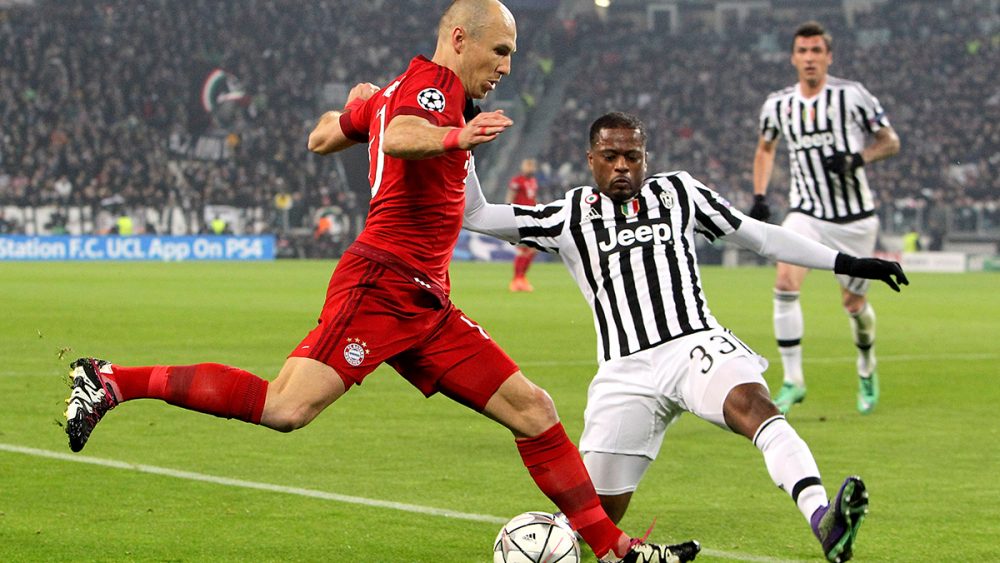Juventus Turin – FC Bayern München 2:2 (0:1)
Guardiola quite surprising left Xabi Alonso on the bench and fielded Arturo Vidal instead, who had also started against Darmstadt last weekend. Medhi Benatia, who just came back from injury, was also sitting on the bench in the beginning. Guardiola continued to trust Kimmich and Alaba in the central roles of the defense. Bernat also showed up somewhat surprisingly in the starting XI. With Götze, Coman and Ribery the Bayern coach also had a number of good offensive options on the bench.
 Formations: Juventus Turin – FC Bayern
Formations: Juventus Turin – FC BayernOn the opposite side Allegri was without defender Chiellini. As expected, the Juve coach selected a back four in his 4-4-2 with Barzagli and Bonucci in the center. In attack former Bayern player Mandzukic began in front of Paulo Dybala.
Before the game started it was still unclear whether Guardiola would have his team line up with a back three with Vidal between Alaba and Kimmich. However, it was at least defensively a rather classic back four with Lahm and Bernat on the wings. In possession Lahm again moved inside repeatedly, in order to support the build-up game next to Vidal.
3 things we noticed
1. Guardiola’s courage is rewarded
In recent years Pep Guardiola has gained a reputation to act rather controlled than brave or creative in away games. The statistical differences between home and away goals under his lead are consequently enormous. Not only a few had also expected a more controlled, retrained orientation against Torino. As so often in his nearly three-year tenure as a coach at Bayern he surprised them all again.
Bayern started the game with an extreme pace and the clear aim to suffocate the game of Juventus from the beginning. With high pressing and a formation high up the pitch, the Reds created tremendous pressure on Juventus in all offensive areas. This was a straight forward approach to keep the home team as far as possible away from the makeshift defensive line.
For 60 minutes it worked excellent. From all directions the guests from Munich attacked Allegri’s team in full sprint. In the first half Lewandowski alone won the ball twice in the penalty box. The scene before the first goals was a good example. Juventus commenced an attack through the center, which was stopped by Thiago, Vidal and Lahm and ultimately led to the 1:0.
In this game Thiago’s underrated qualities in winning the ball back were plain to see. The Spaniard repeatedly attacked the ball carrier and especially suffocated the initial build-up play from Marchisio and Khedira repeatedly. Even Costa earned special praise for his defensive work. The more than 70 percent ball possesion up to the 60th minute were less a product of their own ball circulation, but rather of their described high-speed pressing. The subsitution of the completely ineffective Marchisio at the break was a logical move.
It was remarkable in Guardiola’s approach to see the clear plan to isolate Arjen Robben on the right wing against the nominally weakest Turin defender, Patrice Evra. Because Pogba was strongly oriented towards Philipp Lahm, the strong Frenchman drifted back to the Bayern captain and towards the middle of the pitch. Robben, playing high and extremely wide at the touchline, stretched pitch enormously and was involved in many scenes. It takes some firm conviction to some extent to have such an universally strong player like Pogba basically defended in a 1vs1 by Lahm. Robben helped out only as a last resort. This was risky business, with all the advantages and disadvantages that were disclosed over the 90 minutes of this game.

2. Loss of control after one hour
Whether the high pace from the beginning of the match lead to the lost control by the Bayern team after the 60th minute, is difficult to verify. It’s a fact that Bayern were increasingly lacking the access and domination in in Turin’s half, which so brilliantly worked especially in the first half. Also, because Allegri modified the spacing of his team in central midfield to some extent and thus made it increasingly difficult for Bayern to engage and attack there.
Seven out of eleven shots on goal by Turin occurred after the 60th minute. Juventus were able to move around Bayern’s pressing more often and even established their ball circulation in Bayern’s half. The Bayern team has be blamed at this stage for not slowing down the game to make the ball and their opponents run even more. Bayern’s game staid pretty straightforward and vertical. That Juventus were given the opportunity to run counter attacks when the score line read 2:0 or 2:1, indicates a lack of strategic adjustment. Before Juventus’ first goal, Bayern defended in in a 3v2 situation while running back into defense.
Guardiola certainly had the opportunity to create more control of the ball and the game, to thus somehow adapt and slow down the game by bringing in Alonso after the 70th minute. It is not the first time that Bayern’s better position for the second leg was diminished by a phase of lost control. That was also the case last year in Barcelona. It is hoped that the outcome this time is different.
3. Kimmich pays dearly
Much of this game will be made directly related to Joshua Kimmich. The 21 year old was directly involved in the two goals that Bayern conceded. Before the 2:1 he defended a pass too short and at the 2:2 he was a little bit too late. It is somewhat pointless to speculate how this game would have ended with Jerome Boateng in central defense. It’s a fact that Kimmich is not a central defender. Kimmich is 21 years old and has never played in a Champions League knockout game before. Except for two scenes, he had a good – at times excellent – game on a position that is still new to him.
His calm, his agility in his mind and his feet, his overview, his precision are skills that work well at this level. 104 passes (second-highest) with a success rate of over 90 percent speak for themselves. But Kimmich will also need to take lessons from this game. He will have to face the fact that in the end two negative scenes will “outshine” his overall positive performance over 90 minutes in the public reception. He will also have to learn that small errors, lack of concentration and inaccuracies are immediately punished at this level.
When seasoned professionals look back at their career, dealing with setbacks at a young age is often a decisive factor to affect a career in one direction or the other. Due to the conceded goals, the game in Turin will be the first setback in Kimmich’s career that has started so convincing in Munich. He has every reason to take on this challenge with great confidence and to grow on it.
| Juventus Turin – FC BAYERN 2:2 (0:1) | |
|---|---|
| Juventus Turin | Buffon – Lichtsteiner, Barzagli, Bonucci, Evra – Cuadrado, Khedira (69. Sturaro), Marchisio (46. Hernanes), Pogba – Mandzukic, Dybala (75. Morata) |
| FC Bayern | Neuer – Lahm, Kimmich, Alaba, Bernat (74. Benatia) – Vidal – Robben, Müller, Thiago, Costa (84. Ribéry) – Lewandowski |
| Subs | Ulreich, Rafinha, Alonso, Götze, Coman |
| Goals | 0:1 Müller (43.), 0:2 Robben (55.), 1:2 Dybala (63.), 2:2 Sturaro (76.) |
| Cards | Yellow: Morata / Costa, Lewandowski, Vidal |
| Referee | Martin Atkinson (England) |
| Attendance | 41.332 (sold out) |












In my opinion Manuel Neuer caused the second Turin goal. Yes, Kimmich was a little bit too late and could have prevented that goal, but why didn’t Manuel just kick the ball wide forward in the first place. I know that Pep wants to play in a controlled manner (starting with Manuel), but there are situations (like the one before goal 2) where it would just be better to get the ball out of the danger zone.